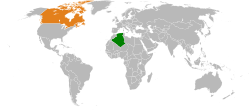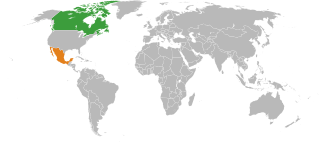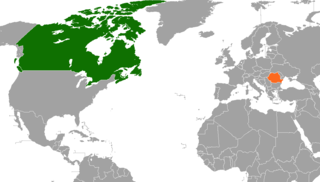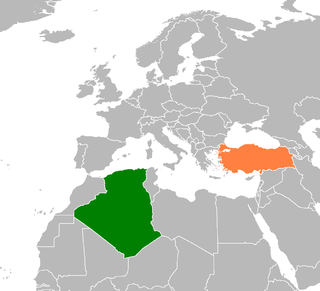 | |
Algeria | Canada |
|---|---|
Canada recognized Algeria following its independence from France in 1962, and formal diplomatic relations were established two years later in 1964. [1]
 | |
Algeria | Canada |
|---|---|
Canada recognized Algeria following its independence from France in 1962, and formal diplomatic relations were established two years later in 1964. [1]
In 2006, Canadian Governor General, Michaëlle Jean, visited Algeria as part of a tour of Africa, during which she promoted the partnership between Canada and Algeria in assisting in African development. [2] In 2010, Algerian President Abdelaziz Bouteflika visited Canada to take part in the G8 summit in Muskoka. [3] Lawrence Cannon, then the Minister of Foreign Affairs, visited Algeria in January 2011 and met with his Algerian counterpart, Minister of Foreign Affairs Mourad Medelci.
In 2019, Canada provided US$400,000 to the UN Refugee Agency to support those living in Sahrawi camps located in southwestern Algeria. [1]
The Algerian community in Canada numbers approximately 67,000 people, most of whom reside in and around Montreal. There are direct flight between both nations with Air Algérie and Air Canada. [1]
Algeria claimed that two Canadians were among the Jihadi militants responsible for a hostage taking at an isolated natural gas plant in the Sahara desert in January 2013. Canada launched its own investigation. In March, the RCMP confirmed that one Canadian's body was identified to be related to the attack. The investigation was slowed by the fact that Canada and Algeria do not share intelligence information. [4]
Algeria is Canada's top trading partner in Africa. In 2018, two-way trade between both nations totaled US$778 million. [1] There are more than 60 Canadian companies doing business in Algeria, and their varied activities range from basic foodstuffs to training services and aeronautics.

Michaëlle Jean is a Canadian stateswoman and former journalist who served from 2005 to 2010 as governor general of Canada, the 27th since Canadian Confederation. She is the first Haitian Canadian and black person to hold this office.

Brazil–Canada relations are the diplomatic relations between the Federative Republic of Brazil and Canada, as well as economic, social and cultural ties. In 2016, approximately 36,000 people in Canada claim to be of Brazilian descent. It's also estimated that there are around 12,000 people in Brazil that are of Canadian descent. Both nations are members of the G20, Organization of American States, United Nations and the World Trade Organization.

The nations of Canada and Mexico established formal diplomatic relations in 1944. Initially, ties between the two nations were dormant, but since the 1990s relations between Canada and Mexico have positively developed as both countries brokered NAFTA.

In July 2001, President Abdelaziz Bouteflika became the first Algerian President to visit the White House since 1985. This visit, followed by a second meeting in November 2001, and President Bouteflika's participation at the June 2004 G8 Sea Island Summit, is indicative of the growing relationship between the United States and Algeria. Since the September 11 attacks in the United States, contacts in key areas of mutual concern, including law enforcement and counter-terrorism cooperation, have intensified. Algeria publicly condemned the terrorist attacks on the United States and has been strongly supportive of the Global War on Terrorism. The United States and Algeria consult closely on key international and regional issues. The pace and scope of senior-level visits has accelerated.

Canadian-Romanian relations are the bilateral relations between the governments of Canada and Romania. Canada has an embassy in Bucharest. Romania has an embassy in Ottawa and three consulates-general. Romania has also three honorary consulate general in Moncton, Québec and Calgary.

Bilateral relations between the Argentine Republic and Canada have existed for over a century. Both nations are members of the Cairns Group, G20, Organization of American States and the United Nations.

Canada and Japan have an amicable companionship in many areas. Diplomatic relations between both countries officially began in 1928 with the opening of the Japanese consulate in Ottawa. In 1929, Canada opened its Tokyo legation, the first in Asia; and in that same year, Japan its Ottawa consulate to legation form.

Canada–Chile relations are the diplomatic relations between Canada and Chile. Both nations are members of the Asia-Pacific Economic Cooperation, Cairns Group, Organization of American States and the Organisation for Economic Co-operation and Development.

Diplomatic relations between Algeria and Greece date back for more than 2000 years. Diplomatic relations have been solid since Algeria's first years of independence. Greece maintains an embassy in Algiers, and Algeria is represented in Greece by its embassy in Athens. Trade between Greece and Algeria is increasing, with imports of natural gas from Algeria an important factor. There have been problems with illegal immigration from Algeria to Greece in recent years, and with Algerian trafficking of Sub-Saharan Africans seeking to enter the European Union.

Canada-Slovenia relations are foreign relations between the Canada and Slovenia. Canada recognized Slovenian independence in January 1992, and established diplomatic relations a year later. Both countries are full members of NATO. There are 40,470 Slovenes who live in Canada as of the 2016 Canada Census.

Algeria has an embassy in Ankara, and a general consulate in Istanbul. Turkey has an embassy in Algiers. Both countries are full members of the Union for the Mediterranean.

Canada–Hungary relations are the bilateral relations between Canada and Hungary, the importance of which centres on the history of Hungarian migration to Canada. Approximately 300,000 Canadians have Hungarian ancestry. Both nations are members of NATO, the OECD and the United Nations.

Canada–Sweden relations are the interstate relations between Canada and the Kingdom of Sweden. They are founding members of the Arctic Council and have positive cultural and economic relations. In addition, there are more than 300,000 Canadians of Swedish descent. The relationship is backed with many mutual treaties, and sees moderate foreign direct investment and trade. One notable commonality for both Canada and Sweden are their commitments to feminist foreign policy.

Canadian–Turkish relations are foreign relations between Canada and Turkey. Both countries are members of the G20, NATO, Organization for Economic Co-operation and Development, Organization for Security and Co-operation in Europe, United Nations and the World Trade Organization.

Canada–Ethiopia relations are foreign relations between Canada and Ethiopia. Both countries established diplomatic relations in 1956. Canada opened an embassy in Addis Ababa in 1957; although Ethiopia opened an embassy in Ottawa in 1962, it was closed the next year due to financial constraints and not re-opened until 1989. In 2021, Ethiopia closed its embassy in Ottawa again due to reshuffling and reorganization. In 2022, Ethiopia reopened its embassy in Ottawa.

Canada–Mongolia relations are foreign relations between Canada and Mongolia. Both countries established diplomatic relations on November 30, 1973. Canada has been represented in Mongolia through an embassy since 2008. Mongolia has an embassy in Ottawa, and in 2002 opened an Honorary Consulate in Toronto. Though Canada and Mongolia established diplomatic ties in 1973, ad hoc linkages and minor activities occurred between the two countries mainly through the Canada-Mongolia Society, which disbanded in 1980. When Mongolia formed a democratic government in 1991 after the collapse of the Soviet Union, Canada began to support Mongolia with donor activities through the International Development Research Centre, Canadian International Development Agency and several non-governmental organizations.